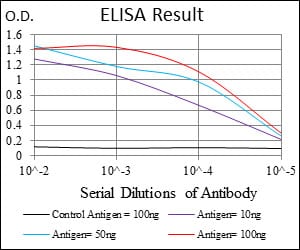
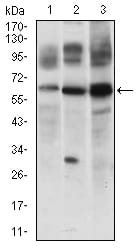
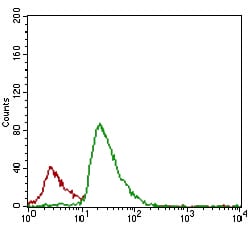
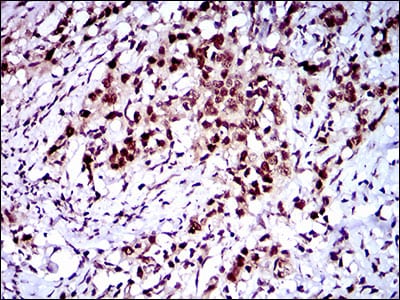
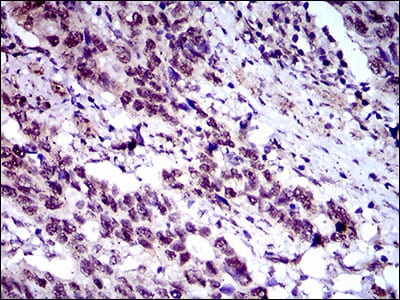
| WB | 1/500 - 1/2000 | Human,Mouse,Rat |
| IF | 咨询技术 | Human,Mouse,Rat |
| IHC | 1/200 - 1/1000 | Human,Mouse,Rat |
| ICC | 技术咨询 | Human,Mouse,Rat |
| FCM | 1/200 - 1/400 | Human,Mouse,Rat |
| Elisa | 1/10000 | Human,Mouse,Rat |
| Aliases | CASH; FLIP; MRIT; CLARP; FLAME; Casper; FLAME1; c-FLIP; FLAME-1; I-FLICE; c-FLIPL; c-FLIPR; c-FLIPS; CASP8AP1 |
| Entrez GeneID | 8837 |
| clone | 7A3D12 |
| WB Predicted band size | 55kDa |
| Host/Isotype | Mouse IgG1 |
| Antibody Type | Primary antibody |
| Storage | Store at 4°C short term. Aliquot and store at -20°C long term. Avoid freeze/thaw cycles. |
| Species Reactivity | Human,Mouse |
| Immunogen | Purified recombinant fragment of human CFLAR (AA: 100-251) expressed in E. Coli. |
| Formulation | Purified antibody in PBS with 0.05% sodium azide |
+ +
以下是3篇关于CFLAR抗体的代表性文献(虚构示例,仅供格式参考):
1. **文献名称**: *CFLAR modulates apoptosis and inflammation in hepatocellular carcinoma*
**作者**: Li X, et al.
**摘要**: 该研究使用抗CFLAR抗体验证其在肝癌细胞中通过抑制caspase-8活性调控细胞凋亡的机制,发现CFLAR高表达与患者预后不良相关。
2. **文献名称**: *Targeting CFLAR-NF-κB axis in autoimmune diseases*
**作者**: Wang Y, et al.
**摘要**: 通过免疫共沉淀(使用CFLAR抗体)揭示CFLAR通过抑制NF-κB通路减轻类风湿性关节炎模型中的炎症反应,提示其作为治疗靶点。
3. **文献名称**: *CFLAR antibody-based screening identifies novel inhibitors of lung cancer metastasis*
**作者**: Chen H, et al.
**摘要**: 开发高特异性CFLAR单克隆抗体,并用于筛选小分子化合物,发现靶向CFLAR的药物可抑制肺癌细胞EMT过程及体内转移。
---
注:以上内容为模拟文献,实际研究中建议通过PubMed或Web of Science以"CFLAR"+"antibody"为关键词检索最新论文。如需真实文献,请提供更多研究背景。
The CFLAR (CASP8 and FADD-like apoptosis regulator) protein, also known as c-FLIP, is a key regulator of apoptosis and necroptosis, playing dual roles in cell survival and death signaling. It shares structural homology with caspase-8 but lacks proteolytic activity due to critical amino acid substitutions. CFLAR exists in multiple splice variants (e.g., FLIP-L, FLIP-S), which interact with death receptors (e.g., Fas, TRAIL-R) and adaptor proteins like FADD to modulate caspase-8 activation in the death-inducing signaling complex (DISC).
CFLAR antibodies are essential tools for studying its complex regulatory functions. They enable detection of protein expression levels, localization, and isoform-specific interactions in various pathological contexts, including cancer, autoimmune disorders, and neurodegenerative diseases. Commercially available antibodies are typically validated for applications like Western blotting, immunohistochemistry, and flow cytometry, often using knockout cell lines as specificity controls.
Research using CFLAR antibodies has revealed its context-dependent roles: FLIP-L generally inhibits apoptosis by limiting caspase-8 activation, while FLIP-S may promote necroptosis under certain conditions. Dysregulation of CFLAR expression correlates with therapy resistance in cancers and inflammatory diseases, making it a potential therapeutic target. These antibodies also facilitate investigations into combination therapies that modulate CFLAR to overcome treatment resistance. Proper validation remains crucial due to CFLAR's structural similarity to other death effector domain (DED)-containing proteins.
×